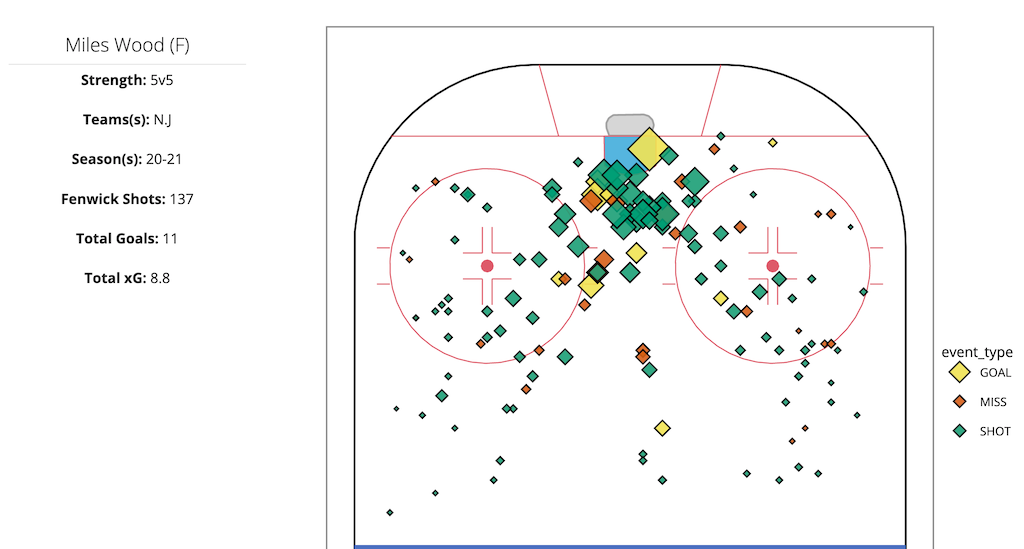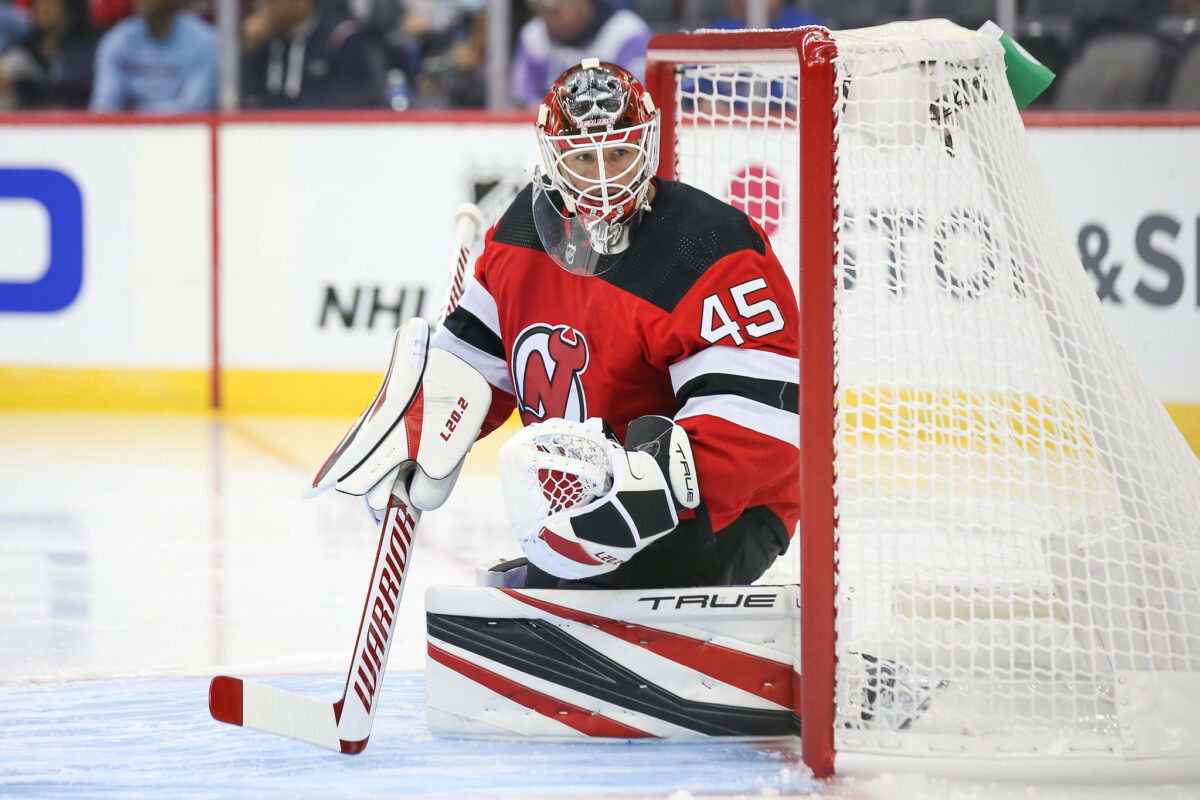Late Thursday evening, the New Jersey Devils announced they had re-signed Miles Wood, one of their last remaining restricted free agents. The two sides came together on a one-year deal that will pay Wood $3.2 million, making him an unrestricted free agent next summer. In doing so, they also avoided an arbitration hearing that would’ve taken place today.
Wood missed 79 of last season’s 82 games after undergoing hip surgery in November. If healthy, the Devils will benefit from having a player with his presence back in the lineup. But with his signing, the team has just a touch over $73,000 in cap space remaining. With only Fabian Zetterlund left to re-sign from their RFAs, general manager Tom Fitzgerald has cap work to do for the upcoming season, though it shouldn’t affect the big picture.
Devils Missed Wood’s Presence a Season Ago
A Devils fourth-round pick in 2013, Wood has played his entire career in New Jersey and is their longest-tenured member alongside Damon Severson. With that said, he’s had an up-and-down stint with the Devils. In 2017-18, the last time they made the playoffs, he finished with 19 goals in 73 games, which would’ve put him on pace for 21 had he played the full 82.
But in the years following, Wood’s production slipped. From 2018 to 2020, he totaled 21 goals in 131 games — an average of 13 goals per 82 games. A significant reason for his shooting percentage falling to seven percent during that stretch was that he was going to the net front much less often than he did in 2017-18. His defensive game dropped off, too, specifically in 2019-20, when his defensive impacts were among the worst on the Devils.
However, he bounced back in 2020-21 after the Devils hired Lindy Ruff to succeed former head coach John Hynes. Wood returned to the old ways that made him stand out in 2017-18, as he finished with 17 goals in 55 games during the COVID-shortened campaign — a pace of 25 goals over 82 games. When looking at his five-on-five shot chart for that season, most of his shots and goals came from the slot and around the crease:

Wood’s high-danger numbers back up what you see in the chart. At five-on-five, he finished with 37 high-danger chances, second on the Devils to Jack Hughes. Aside from a few stretches where Nathan Bastian occupied the role, that type of net-front presence is something the Devils also missed on their power play last season. Having Wood healthy and able to get to high-danger areas to score some dirty goals should help quite a bit. But to make room for him, Fitzgerald will have to move a contract or two to free up some cap space.
Who Devils Could Trade After Re-signing Wood
In acquiring John Marino and Erik Haula through trades and signing Ondrej Palát in free agency, it became apparent that the Devils would need to clear cap space for 2022-23. After re-signing Jesper Bratt to a one-year deal worth $5.45 million earlier this week, it was quite clear that the Devils wouldn’t have any choice but to move some salary eventually, even before re-signing Wood.
Fitzgerald will have options to move cap space in the coming days and weeks, with the best bets being forwards since they have a pretty crowded group up front:
- Yegor Sharangovich – Jack Hughes – Dawson Mercer
- Palát – Nico Hischier – Bratt
- Jesper Boqvist – Haula – Tomáš Tatar/Andreas Johnsson
- Wood – Michael McLeod – Nathan Bastian
Two players Fitzgerald could consider moving are Johnsson and Tatar, both of whom are entering the final years of their contracts. Johnsson had a bounce-back year in 2020-21, finishing with 13 goals and 35 points in 71 games — a 40-point pace over 82 games. That’s right in line with where he paced in his two seasons with the Toronto Maple Leafs before the Devils acquired him in a trade during the 2020 offseason. However, he seemed to fall out of favor with the Ruff at the end of last season, as he was in a fourth-line role and was even a healthy scratch on a couple of occasions.

Johnsson has a cap hit of $3.4 million for the 2022-23 season, but his base salary is only $750,000, as the rest of his pay came in signing bonuses. He has a 10-team no-trade clause, so trading him won’t be as simple as sending him to a bottom-feeder looking to add some cap space to get an asset in return.
With that said, someone who produced at a 40-point pace this past season is a player a playoff contender could find valuable as a depth scorer, assuming they have the cap space. The Devils wouldn’t get anything significant in return, perhaps a mid-round pick, but it’d be better than attaching a pick or going the future considerations route.
Related: Devils & Bratt Bet on Prove-it Deal for 2022-23
As for Tatar, it seems unlikely the Devils trade him, even though he doesn’t have any no-trade protection. With so many teams tight on cap space, his $4.5 million cap hit will likely be too expensive for most teams to acquire other than the Buffalo Sabres, Anaheim Ducks or Arizona Coyotes. Plus, at 31 years old, I’d bet on the Devils wanting to have his veteran presence on what is the third youngest roster in the NHL.
Devils Using LTIR Wouldn’t Help Much
Another option the Devils have is to use long-term injured reserve (LTIR) to give them some cap relief. They should have the ability to do so since Jonathan Bernier is coming off major hip surgery and probably won’t be ready to start the regular season at the very least. Since he has a cap hit of $4.125 million for 2022-23, the final year of his contract, that’d give the Devils the cap space they need to be compliant by the start of the regular season.
However, there are some complications with using LTIR. Hip injuries can be career-enders for goaltenders. But based on what Fitzgerald said at a pre-draft media availability earlier in July, they’re not shutting the door on Bernier suiting up for the team again. If that’s the case, any cap relief they get by putting Bernier on LTIR would only be temporary until he joins the active roster again.

Since Bernier could return, trading a forward makes the most sense. The Devils have 13 forwards for 12 spots, and that doesn’t include a young player like Zetterlund or Alexander Holtz making the team out of camp. They’ll likely waive someone after the preseason concludes as well, but they won’t get to where they need to roster- and cap-wise without trading someone. Plus, if you can avoid using LTIR to create cap flexibility, it’s best to do so, even if it’d only be for a year.
Wood’s New Contract Doesn’t Affect Long-term Cap Outlook
It may seem like $3.2 million is a bit much to pay Wood after he only played three games a season ago. With that said, he had a qualifying offer of $3.5 million, so the Devils paid him under what his QO was. The team’s ask in arbitration was $2.975 million, 15 percent below his QO since it was team-elected arbitration, while Wood’s ask was $3.85 million.
Related: Devils Keep Bratt’s Leadership in the Lineup & Avoid Arbitration
Essentially, the two sides compromised a bit below the middle. The lowest the Devils could’ve paid Wood was $2.975 million since that was their ask for arbitration. But even if they agreed to that number, it would’ve only made a $225,000 difference in the Devils’ current cap space, so a cap-related trade was always going to be in the cards.
Wood’s deal is also only for one year, so while they may be in a tight spot with the salary cap for 2022-23, they project to have over $36 million in cap space a little less than a year from now. That’s with Wood, Johnsson, Tatar, Bernier, Haula, Severson and Ryan Graves all coming off the books as UFAs. The Devils may retain some of those players, but they certainly won’t retain all of them.

The Devils’ most notable RFAs next summer will be Bratt, Sharangovich and Mackenzie Blackwood. And while they’ll have to fill the vacancies that letting their pending UFAs would create, some of those will be taken up by players on entry-level contracts (Holtz, Luke Hughes, Šimon Nemec, etc.). So their long-term cap outlook is quite good.
Is giving Wood $3.2 million for one season an overpay? Perhaps, but there’s no long-term commitment, and they need a player like him in their lineup for next season at the very least. If he bounces back to his 2020-21 levels when he produced at a 25-goal pace, he’ll be worth the price. And even though they have cap work to do for the upcoming season, it’s only in the short-term and won’t affect how they want to build the team moving forward.
* * *
Advanced stats from Natural Stat Trick